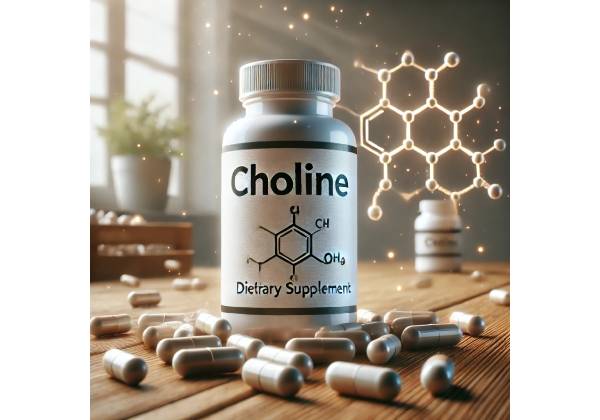What is choline?
Choline is an important nutrient for brain development, liver function, and nerve signaling. It is a water-soluble compound that is neither a vitamin nor a mineral but has properties similar to B-complex vitamins. Choline occurs naturally in foods such as eggs, meat, fish, dairy products, and certain plant-based sources such as soybeans and quinoa. Despite its presence in the diet, many people may not consume enough choline, resulting in potential deficiencies that affect cognitive and psychiatric health.
Choline is important for mental health because it is a precursor to acetylcholine, a neurotransmitter that regulates memory, attention, learning, and mood. Furthermore, choline is involved in the production of phosphatidylcholine, which is an important component of cell membranes, particularly in neurons. This nutrient is essential for the structural integrity of brain cells and efficient neural communication. New research has highlighted the potential benefits of choline supplementation in preventing cognitive decline, improving memory, and treating mood disorders like depression and anxiety.
With its growing recognition as a critical nutrient for cognitive function and emotional stability, choline is becoming more popular among people looking to improve their mental health, especially as part of an integrative approach to treating psychiatric conditions.
Choline Structure and Composition.
Choline, an organic, water-soluble compound, has the molecular formula C₅H₁₄NO. The structure consists of a quaternary ammonium cation (N⁺) attached to a hydrocarbon chain containing hydroxyl (-OH) and methyl groups (-CH₃). Choline’s molecular structure enables it to function as a versatile molecule in the body, participating in a variety of critical pathways, including neurotransmitter synthesis and cell membrane integrity.
Choline’s most important role is as a precursor to acetylcholine, a neurotransmitter required for cognitive functions like learning, memory, attention, and emotional regulation. The enzyme choline acetyltransferase converts choline into acetylcholine in the brain, allowing neurons to communicate and transmit signals more efficiently. This neurotransmitter also affects the autonomic nervous system, influencing bodily functions such as heart rate, digestion, and respiration.
Choline is also essential for the synthesis of phospholipids, particularly phosphatidylcholine, which is an important component of cell membranes. Phosphatidylcholine helps neurons maintain structural stability, facilitating the formation of new synapses and supporting neuroplasticity, the brain’s ability to adapt and reorganize neural connections. Neuroplasticity is essential for learning and recovering from brain injuries or psychiatric disorders.
In addition to producing acetylcholine and phosphatidylcholine, choline participates in methylation reactions by converting to betaine. Methylation is required for gene expression, DNA repair, and the regulation of homocysteine levels. Choline-supported methylation processes reduce elevated homocysteine, which is a risk factor for cognitive decline and mental health disorders. This ability to regulate homocysteine emphasizes choline’s role in neurological and psychiatric health.
Choline can be obtained through dietary sources, but it is also produced endogenously in small amounts by the liver’s phosphatidylethanolamine N-methyltransferase (PEMT) pathway. However, dietary intake remains the primary source, with supplementation often recommended for those with higher cognitive demands, pregnant women, and older adults who may require more choline.
The Mental Health Benefits of Choline: Mechanisms and Effects
Choline’s role in mental health is multifaceted, influencing many aspects of brain function, including neurotransmitter synthesis, cellular repair and gene expression. Choline’s effects on cognitive performance, mood regulation, and neuroprotection make it an important nutrient for improving psychiatric well-being and promoting long-term mental health. Below, we look at the primary mechanisms by which choline improves mental health.
Cognitive Function and Memory Enhancement
Choline is best known for its ability to improve cognitive function, specifically through its conversion to acetylcholine, a neurotransmitter required for learning, memory, and attention. Acetylcholine helps neurons communicate in areas of the brain responsible for cognitive processes, such as the hippocampus, which is essential for memory formation and retrieval. Adequate levels of acetylcholine are required for both short-term and long-term memory, and choline supplementation has been shown to improve these cognitive processes.
Several studies have shown that choline improves memory, particularly in older adults experiencing age-related cognitive decline. Research published in the American Journal of Clinical Nutrition found that people who consumed more dietary choline performed better on memory tests and had a lower risk of developing dementia or Alzheimer’s disease. These findings highlight the potential of choline as a preventive measure for cognitive impairments caused by aging and neurodegenerative diseases.
Choline supplementation has been linked to improved focus, mental clarity, and information retention in younger populations, particularly students and those working on intellectually demanding tasks. Choline’s cognitive-enhancing effect makes it an important nutrient for maintaining brain health over time.
Mood Regulation and Depression
Choline’s effect on mood regulation is primarily due to its effect on acetylcholine and its role in the methylation process. Low acetylcholine levels have been linked to mood disorders including depression, anxiety, and bipolar disorder. Choline supplementation, which increases acetylcholine levels, may help improve mood, reduce anxiety, and increase emotional stability.
In addition to producing acetylcholine, choline regulates homocysteine by converting it to betaine, a methyl donor. Elevated homocysteine levels have been linked to an increased risk of depression and cognitive decline, and methylation is critical for keeping homocysteine under control. A study published in the Journal of Psychiatric Research discovered that people who consumed more dietary choline had lower rates of depression, most likely due to improved homocysteine regulation and neurotransmitter function.
Furthermore, choline’s role in neuroplasticity promotes emotional resilience, enabling the brain to adapt to stress and heal from trauma. This ability to promote neural adaptability is critical for treating mood disorders and maintaining overall psychiatric health.
Neuroprotection and Prevention of Cognitive Decline
Choline is critical for protecting the brain from neurodegenerative diseases and cognitive decline, especially in older populations. As a precursor to acetylcholine, choline helps to maintain cholinergic neurons, which are among the first to deteriorate in conditions such as Alzheimer’s disease. Choline supplementation, which preserves acetylcholine levels, can slow the progression of neurodegenerative diseases and protect cognitive function in older adults.
Choline’s neuroprotective effects are enhanced by its role in maintaining cell membrane integrity via phosphatidylcholine synthesis. Healthy cell membranes are required for neuron function, synaptic transmission, and the brain’s ability to form new neural pathways. Phosphatidylcholine also helps repair damaged neurons, which is especially important for people recovering from traumatic brain injuries or strokes.
Choline’s ability to promote methylation and lower homocysteine levels adds to its neuroprotective properties. Elevated homocysteine levels are associated with increased oxidative stress and inflammation in the brain, both of which are risk factors for neurodegenerative diseases. Choline prevents cognitive decline by regulating homocysteine levels.
Attention and Focus
Choline supplementation has also been shown to improve attention and focus, especially in people with ADHD. Acetylcholine regulates attention and concentration, and increasing its availability through choline supplementation may help improve focus and alleviate ADHD symptoms.
A study published in the Journal of Clinical Psychopharmacology found that children with ADHD who took choline supplements improved their attention, hyperactivity, and impulsivity. While more research is needed to fully understand choline’s potential in ADHD management, these findings indicate that it may be a natural and effective way to support cognitive function in people with attention disorders.
Brain Development and Mental Health during Pregnancy
Choline is especially important during pregnancy because it influences fetal brain development. Adequate choline intake during pregnancy promotes the development of the fetal nervous system, specifically the hippocampus, which is required for memory and learning. According to research, maternal choline intake is associated with improved cognitive outcomes in children and may reduce the risk of neurodevelopmental disorders such as autism and attention deficit disorder.
Furthermore, choline’s ability to regulate homocysteine levels during pregnancy is critical for preventing birth defects, particularly neural tube defects. This makes choline an essential nutrient for maternal mental health and fetal brain development.
Dose and Administration of Choline
The recommended daily choline intake varies with age, gender, and life stage. The recommended daily intake for adult men is around 550 mg, while women get around 425 mg. Pregnant and breastfeeding women require more choline, with recommendations increasing to 450-550 mg per day to promote fetal brain development.
Choline supplements come in a variety of forms, including choline bitartrate, phosphatidylcholine, and alpha-GPC (glycerylphosphorylcholine), with alpha-GPC being especially beneficial for cognitive function. Choline supplements are available, as well as dietary sources such as eggs, liver, fish, and soybeans. It is best to take choline supplements with food to improve absorption and reduce gastrointestinal discomfort.
Possible Risks and Side Effects of Choline
Choline is generally well-tolerated, but excessive consumption may cause nausea, diarrhea, and a fishy body odor due to the buildup of trimethylamine, a byproduct of choline metabolism. Most side effects are minor and occur only at doses significantly higher than the recommended daily intake.
Individuals with liver or kidney disease, as well as those with trimethylaminuria (a condition that impairs the body’s ability to break down trimethylamine), should consult their doctor before beginning choline supplementation. Furthermore, those taking medications that affect liver enzymes or methylation processes should exercise caution, as choline supplementation may interact with these drugs. Pregnant and breastfeeding women should adhere to the recommended daily intakes to promote fetal development while avoiding excessive doses.












